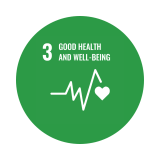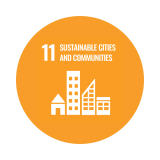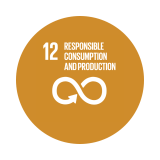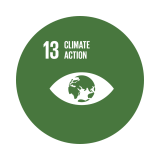Philips Pensioenfonds makes conscious 'responsible' choices in the policy for responsible investments. For example, by excludiing specific types of companies we do not want to invest. But also by investing part of the portfolio in companies that can make a positive contribution to themes such as 'health and well-being' and 'responsible consumption and production'. Finally, it is examined whether sustainability aspects influence the risk and return of our investments. We will explain these three aspects of our policy further below.
1. Exclusion
Philips Pensioenfonds has laid down in its policy for responsible investments in which companies and countries the Fund does not wish to invest in. A distinction is made between companies and countries.
Companies
There is a list of countries whose companies domiciled in these countries are excluded, as the necessary data to assess whether these companies meet our criteria is not available. Philips Pensioenfonds also refuses to invest in companies that are involved in the production of controversial weapons: weapons that do not distinguish between military and civilian targets, and that in many cases cause casualties long after the conflict has ended. International laws and regulations have made most of these controversial weapons illegal, or restrict their use.
Exclusion list
Would you like to know in which companies and countries Philips Pensioenfonds does not wish to invest?
Go to the Exclusion list (in Dutch)Philips Pensioenfonds has a list of five types of weapons: Anti-personnel mines, Biological weapons, Chemical weapons, Cluster munitions and Nuclear weapons. Similarly, the Pension Fund does not invest in companies that produce tobacco products: companies that generate revenue from manufacturing cigarettes, for example. The Fund also excludes companies that derive a large part of their turnover from polluting energy sources. These are companies that generate more than 25% of turnover with activities in oil tar sands (extraction) and/or coal (extraction and/or energy generation).
Lastly, the pension fund sometimes refuses to invest in companies that violate the international guidelines for corporate social responsibility. Philips Pensioenfonds applies the Global Compact principles, the OECD guidelines and the UNGPs for this. Before Philips Pensioenfonds excludes a company, it first initiates a dialogue with that company (see 'care for investments'). If that dialogue does not yield the desired outcome, the pension fund can decide to exclude the company for its violation of the international guidelines. The pension fund determines what companies to exclude on an annual basis.
Countries
Additionally, the pension fund does not invest in government bonds from certain countries. These are countries for which the necessary data to assess whether they meet our criteria is not available, countries if either the country as a whole or individuals who are part of its government have been declared subject to substantial international sanctions, and of countries that are notable laggards when it comes to ESG standards. The pension fund determines what countries to exclude (for government bonds) on an annual basis. In addition, companies are excluded that are controlled by the governments of these excluded countries (state-owned companies).
2. Sustainable Development Goals (SDG)
Philips Pensioenfonds chooses to invest in companies that make a positive contribution to sustainable development goals. For example, by investing specifically in a company that invests a lot in sustainable energy sources. And by investing in bonds that finance projects that contribute to sustainable development. To this end, the Fund is in line with four sustainable development goals (or SDGs) of the United Nations. These have been selected because we think they are suitable for Philips Pensioenfonds and there are good investment opportunities around these themes.
Below are the four goals that Philips Pensioenfonds wants to focus on. Each with a reference to an accompanying article in our Magazine Generaties. In these articles, we explain how we take the chosen SDGs into account in our investment choices. Specific examples and applications of companies and governments that contribute to this are included.

3. Good health and well-being
How do we take SDG 3 'Good health and well-being' into account in our investment choices?
Read more in Generaties (in Dutch)
11. Sustainable cities
How do we take SDG 11 'Sustainable cities and communities' into account in our investment choices?
Read more in Generaties
12. Responsible consumption
How do we take SDG 12 'Responsible consumption and production' into account in our investment choices?
Read more in Generaties
13. Climate action
How do we take SDG 12 'Climate action' into account in our investment choices?
Read more in GeneratiesAdjusting the portfolio step-by-step
This part of the responsible investment policy cannot be realized overnight. This first requires research. For example, how will you measure the contribution of an investment to these themes? And which investors can we best engage for this? How do we keep the implementation simple and the costs acceptable? We therefore opt for a step-by-step introduction per asset class.
The first major step was taken in December 2021 by aligning our portfolio of equities in developed markets more closely with the Sustainable Development Goals (SDGs). In 2023, we also applied this for emerging markets. And in 2024, investments in global developed market government bonds were also aligned with the SDGs. You can read more about this in Generaties June 2021 (in Dutch) and Generaties December 2024.
Investing in 'green companies'
Companies that generate more than 10% of their turnover from products and services that contribute to one or more of the four SDGs are called 'green companies'. It depends on the portfolio which part of the portfolio we invest in these companies.
- In the portfolio with equities in developed markets, we have increased our investment in SDG companies by 20 percentage points since 2021. As of June 30, 2024, this share is 35% instead of 15% in a portfolio that would not take SDGs into account.
- In 2023, we have also aligned the portfolio with equities in emerging markets more closely with the SDGs. There are fewer SDG companies in emerging markets than in developed markets. As of June 30, 2024, the share of SDG companies is 13% instead of 7% in a portfolio that does not take SDGs into account. The increase is therefore approximately 5 percentage points. The companies in this portfolio also collectively emit 30% less CO2 per euro of turnover, weighted by how much we invest per company.
Investing in green government bonds
In 2024, the portfolio of global government bonds has also been aligned with the SDGs. Green government bonds are specifically intended for financing projects that contribute to sustainable development. But social and societal projects can also be financed with green bonds. We already invested around 9% of the portfolio of global government bonds in green government bonds; we have increased that to 15%, as of December 2024.

3. Risk and returns
Sustainability aspects (such as the environment, social aspects and governance) can influence the risks of an investment, both positively and negatively. When making investment choices, it is always assessed whether the expected return is in balance with the associated risks. In this way too, sustainability aspects play a role in our policy and its implementation.